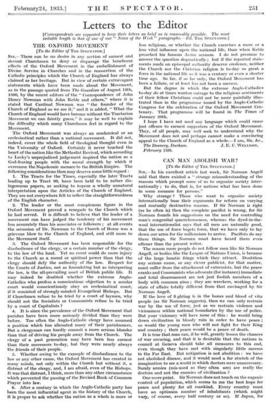Letters to the Editor
[Correspondents are requested to keep their letters as brief as is reasonably possible. The most suitable length is that of one of our News of the Week. paragraphs.—Ed. THE SrEctvroal
-THE OXFORD MOVEMENT
[To the Editor of THE SPECTATOR.]
SIR,—There can be no desire in any section of earnest and devout Churchmen to deny or disparage the beneficent effects of the Oxford Movement in the embellishment of Divine Service in Churches and in the reassertion of the Catholic principles which the Church of England has always claimed as her heritage. But in view of certain extravagant statements which have been made about the Movement, as in the passage quoted from The Guardian of August 13th, 1890, by the recent editors of the " Correspondence of John Henry Newman with John Keble and others," where it is stated that Cardinal Newman was " the founder of the Church of England as we see it," and it is added, " What the Church of England would have become without the Tractarian Movement we can faintly guess," it may be well to explain the difficulty which many Churchmen feel in regard to the Movement.
The Oxford Movement was always an academical or an ecclesiastical rather than a national movement. It did not, indeed, cover the whole field of theological thought even in the University of Oxford. Certainly it never touched the heart of the nation like the Methodist Revival, which according to Lecky's unprejudiced judgement inspired the nation as a God-fearing people with the moral strength by which it overcame the Napoleonic menace to the British Empire. The following considerations then may deserve some little regard : 1. The Tracts for the Times, especially the later Tracts leading up to Tract 90, have been held to be rather dis- ingenuous papers, as seeking to impose a wholly unnatural interpretation upon the Articles of the Church of England. They are not everywhere felt to reflect the straightforwardness of the English character.
2. The leader or the most conspicuous figure in the Oxford Movement proved a renegade to the Church which lie had served. It is difficult to believe that the leader of a movement can have judged the tendency of his movement less accurately than his associates or followers ; at all events the secession of Dr. Newman to the Church of Rome was a grievous blow to the Church of England, and still more to the Movement itself.
3. The Oxford Movement has been responsible for the disobedience of the clergy, or a certain number of the clergy, to the law of the land. Yet no event could do more injury to the Church as a moral or spiritual power than that the clergy should defy the authority of the law. Respect for the Courts of Justice, not as formulating but as interpreting the law, is the all-prevailing asset of British public life. It may indeed be doubted whether the extreme Anglo- Catholics who profess a conscientious objection to a secular court would conscientiously obey an ecclesiastical court, if it consisted of strongly-minded Evangelical Bishops. But if Churchmen refuse to be tried by a court of laymen, why should not the Socialists or Communists refuse to be tried by a court of Capitalists ?
4. It is since the prevalence of the Oxford Movement that parishes have been more seriously divided than they were before. Too often the Anglo-Catholic clergy have assumed a position which has alienated many of their parishioners. But a clergyman can hardly commit a more serious blunder than that of driving his people away from the Church. The clergy of a past generation may have been less earnest than their successors to-day, but they were nearly always the friends of their people.
5. Whether owing to the example of disobedience to the law or any other cause, the Oxford Movement has created in many minds, not only within the Church but without it, a distrust of the clergy, and, I am afraid, even of the Bishops. It was that distrust, I think, more than any other circumstance which prevented the passing of the Revised Book of Common Prayer into law.
6. After a century in which the Anglo-Catholic party has been the most influential agent in the history of the Church, it is proper to ask whether the nation as a whole is more or less religious, or whether the Church exercises a more or a less vital influence upon the national life, than when Kehl° preached his famous Assize sermon. I do not presume to answer the question dogmatically ; but if the reported state- ments made on episcopal authority deserve credence, neither the Clmrch nor the Christian religion is to-day so great a force in the national life as it was a century or even a shorter time ago. So far, if so far only, the Oxford Movement has been a failure, or at least has not been a success.
But the degree in which the extreme Anglo-Catholics to-day do at times wanton outrage to the religious sentiments of their fellow Christians could not be more painfully illus- trated than in the programme issued by the Anglo-Catholic Congress for the celebration of the Oxford Movement Cen- tenary. That programme will be found in The Times of January 20th.
I hope I have not used any language which could cause just offence to earnest supporters of the Oxford Movement. They, of all people, may well seek to understand why the Movement does not and perhaps cannot make a convincing appeal to the Church of England as a whole.—I am, Sir, &c.,






































 Previous page
Previous page